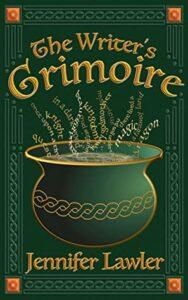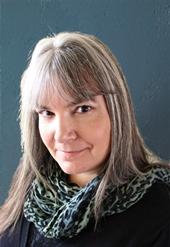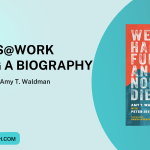Writers@Work: Create a Writer’s Grimoire
March 7, 2023
Note From Rochelle
Dear Writers,
When I surveyed you last month, many of you said you’d love to try a write-in group. Now you can!
On the next two Mondays from 5:00-6:00 PM CT, I will be hosting a write-in. That’s when a group of people come together online and write. We’ll start with a short reading and then write for 45 minutes. We’ll end the session with another dose of inspiration–and that’s it. You’ll leave with work completed.
I’m charging a nominal fee for these two sessions–just $5 each. All you need to do is sign up and show up and write! You can sign up here: Write Now! Write Here Session. (You can sign up for one session at a time or both at once–let me know if you have challenges!)
For today’s post, I interviewed Jennifer Lawler, who has written a fantastic new book, The Writer’s Grimoire. She’ll share with you how she created her first grimoire and how she’s found success with independent publishing.
Happy writing,
Rochelle, the Write Now! Coach
Writers@Work: Create a Writer’s Grimoire
An Interview with Jennifer Lawler
Welcome, Jennifer. I love your new book, The Writer’s Grimoire and the journal that goes with it. Can you tell us about it?
 Thanks! I’ve been a writer for many years and for a long time I kept panicking every time I’d start a new project – didn’t matter if it was a blog post, an essay, an article assigned by an editor, a novel, or a nonfiction book and it didn’t matter how many times I’d done it—I would wonder what I was doing.
Thanks! I’ve been a writer for many years and for a long time I kept panicking every time I’d start a new project – didn’t matter if it was a blog post, an essay, an article assigned by an editor, a novel, or a nonfiction book and it didn’t matter how many times I’d done it—I would wonder what I was doing.
So I started collecting little reminders for myself—this started off as a checklist I would read at the beginning of each project, things like, “Have you defined what this project is?” and “How much time do you have to write it?” and that would help.
And then at some point I started writing down notes like, “Remember, halfway through you always think everything is crap. It’s not.” And that helped, too. I stopped panicking and started feeling more confident and assured.
And then around that point—maybe fifteen years ago—I went on a creative retreat with a friend, and I learned how to use meditation to go segue into and out of writing sessions.
I wrote down how to do this (I write down everything). Then when I began exploring the witch side of myself, I began to incorporate specific spells to help me deal with common issues.
Then maybe ten years ago, I started making all of this into an actual grimoire. At the time I was doing a lot of scrapbooking with my daughter, so I had a physical grimoire that I decorated. (Now I do so much traveling, and I’ve moved so much, that I keep everything online.)
A few years ago I thought it would be nice to turn this into a resource other people could use and that’s how The Writer’s Grimoire came about.
I’ve noticed that you’ve published many books—some under your own imprint, some with traditional publishing houses. Can you talk about the benefits of each?
I started out so long ago that there really wasn’t a good option to traditional publishing. Self-publishing meant you had to invest thousands of dollars into printed books and then figure out how to distribute and sell them. So, it wasn’t a very realistic option for most people at that time, including me.
I learned how to write commercially viable books, fiction and nonfiction, and I enjoyed some success, but like most writers I never became a household name, selling millions of copies.
And I became more and more disenchanted with traditional publishing the more I worked in and around it. I mean, I had a nice little career, but getting published didn’t change my life. It didn’t solve any of my problems. I mean I got some ego strokes from seeing my books in bookstores and having a book go to auction and that kind of thing, but it was kind of . . . who cares? Really?
What I really cared about was when a reader sent me an email about how my work helped her get through a devastating car accident—not because I had brilliant words of advice or anything but because my novels were entertaining and took her mind off it.
So I started writing fiction without worrying about who was going to publish it. Just telling the stories I wanted to tell in the way I wanted to tell them. And that was FANTASTIC. That, I cared about. I didn’t want to hassle with trying to find an agent and publisher for these novels. I started from the position that I was going to self-publish them. And that’s what I’m doing now.
I also decided to do that with my nonfiction. I wanted to write my really niche-y nonfiction ideas (like The Writer’s Grimoire), without trying to convince a traditional publisher that there would be thousands of readers. I don’t care if there are thousands of readers. I care if some people find it useful or inspirational.
Now, traditional publishing definitely sells more books than self-publishing does. But most of us aren’t going to get traditional publishing deals. And if/when you do, you’re rarely writing the book of your dreams, the one that comes from the heart. You, like me, have probably figured out what is commercially viable and you’re writing that.
And if that works for you, more power to you! But for me, I’ve decided if I want to dance to someone else’s tune, it needs to be a hell of a lot more profitable than traditional publishing is.
Many of the newsletter readers would love to publish their own work. Can you offer a few tips and tools for writers who want to do this?
If you’re a newer writer, definitely get some beta readers. You probably don’t know what your story’s weaknesses are and they can help.
Once you’ve learned all you can from that, hire an experienced developmental editor to help you learn more. I’m not just saying that because I’m a dev editor. I’m saying it because newer writers all make the same kinds of mistakes, and it is very hard for them to see these mistakes in their own work.
After that, have a screen reader read your work to you, as this will help you spot errors and problems in your story.
Finally, do invest in a good cover. This is not something to try to do yourself!
I’m amazed at all that you juggle—editing, parenting, writing. What are some of your tips for being productive—and staying sane!
Well, I’m can’t claim to have stayed sane 😊
I have two main productivity “tools”: an accountability buddy (this is now an accountability group) and a work buddy. In the accountability group, which I run, we post our goals for the week, check in on Wednesdays and help each other unsnarl and problems or glitches, and wrap-up on Fridays with a summary of what we accomplished. We try to troubleshoot why we didn’t accomplish things we didn’t accomplish but without trying to beat ourselves up over it.
The other thing I do each week is have a work “date” with my work buddy. This is a friend of mine who lives in Los Angeles, too, and is also a freelancer. We meet for about three hours and at the top of each hour we report on our must-dos and then we get them done.
Whatever I’m struggling to do, I bring to these work dates, and I ALWAYS get it done!

Other than that, I have pared down a lot, including things like hobbies. But also living space. I used to have to hire a housekeeper to come in a couple times a month to keep my three-bedroom house under moderate control. Now my daughter and I live in less than 500 square feet, and it’s so easy!
I also delegate a lot to my daughter. She has medical problems and is intellectually disabled, but where we live now, she can walk to the grocery store and the bank and the drug store – so she does all of our weekly errands.
 What are you reading now?
What are you reading now?
Right now I’m Maria Tatar, THE HEROINE WITH 1,001 FACES, a fantastic dive into classical myths from the female perspective.
 About the author. Jennifer Lawler is the author or coauthor of more than forty novels and nonfiction books, including her popular Dojo Wisdom for Writers and her newest book for writers, The Writers’ Grimoire. She has worked as an acquisitions editor and literary agent and now teaches story editing. Her website is www.JenniferLawler.com.
About the author. Jennifer Lawler is the author or coauthor of more than forty novels and nonfiction books, including her popular Dojo Wisdom for Writers and her newest book for writers, The Writers’ Grimoire. She has worked as an acquisitions editor and literary agent and now teaches story editing. Her website is www.JenniferLawler.com.















